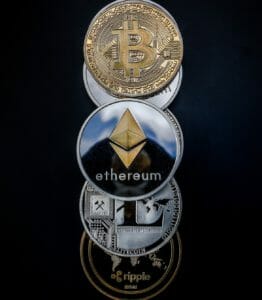The Future of Money – A Fiat of Fiats
Traditionally money is just currency; proof of some agreed value, symbolized and made real by paper, plastic or coin, with any number of appointed stewards and middlemen. Whether the dollar or rupee, traditional currency is the output of creative, widely adopted agreements between parties that are in essence just enacted fiat systems. With the invention of blockchain, smart contracts, and tokenized digital currency, fiat agreements are still nearly the whole idea behind currency, except for now, they are off-paper, controlled by a ‘fiat of fiats,’ oracle data inputs, and popular work and will, rather than by middlemen, governments, or Libor Scandal-laden Wall Street. In this way, we are moving to a fairer monetary ‘oracle fiat reality,’ and away from a middleman gatekeeper arrangement, away from being controlled by false Robinhoods and real Madoffs. We are moving to a monetary reality that engenders much greater equality, transparency and democracy.

Blockchain can expand into spaces where physical money and gold standards cannot. Resource-based economies are looking like things of the past, or are soon to be. Resources are limited, agreements and imaginations are not. These economic ideas are all interrelated, but blockchain systems of finance allow the spender to further escape a resource-based economy and enter into the oracle agreement-based economy. The fiat of the fiats, if you will.
It is for this reason that many in power based on their resource control, are made nervous by this ‘new money’ tech. To them and their traditional, sensitive hierarchical ways, with their hunger for power over others, resources, and systems of things, it seems adversarial to create options that provide another way, especially one based on consensus. But it’s already been done, and so we now see the scramble for power by those who don’t know or want this. The current ways of competition and modes of control come to claim ground, but they are out of their depth, and their ideologies that speak to dominance and control, to exclusively, are outdated. Ethics, fairness, and equality play much larger roles in money’s future, and also call to account those lacking these traits. Blockchain algorithms necessitate agreements be honored, their inputs be precise, and their histories be transparent. If those ways make you want to have a tantrum, maybe it’s you lacking something, not them.
Decentralized versus centralized power, especially in the form of oracle control, will be big parts of the ethical and philosophical economic considerations going forward. Given these realities, it seems clear that the future of money is populist.
![]()
Oracle Accounting
In new tech fiat systems, solving oracle accounting and data problems is not left to one company, group, or government. This smart contract accounting is likely to evolve a first iteration of quantum accounting, or accounting for the ‘known unknowns.’ They provide great training ground to confront the ‘real reality’ we face around modern currency. The, “Who says?” of it all. Using Byzantine Fault Tolerance (BFT) ideas to screen aggregates of oracle data before input determination for smart contracts, is one route toward securing an untainted plurality preference and verified, factual information. In this way, probabilistic off-chain world events can be represented algorithmically. Other ways of screening are being explored, putting preference for Proof of Work algorithms over Proof of Stake. These dynamics are constantly being improved upon and are definitely spaces to watch. The questions regard a flow between what is and what could be, and how to quantify that flow.
We have to recognize that the deterministic nature of blockchains, given oracle and data variability, is not absolute. Probabilistic frameworks must be employed by deterministic blockchains in order to account for the persistent, omnipresent ‘known unknowns’ of reality. Without this level of abstraction, even and especially within the blockchain smart contract, one cannot claim to be relating-to, or representative-of, ontological reality, or “real” reality. And this is a philosophical problem that even the Ancient Greeks were dealing with. Philosophers have long debated the questions of ‘what is what,’ and the ‘who says-ness’ of it all. With this expansive new era of money, we see these oldest dilemmas resurface with new urgency and expansiveness.
Blockchain and smart contract evolution are not unlike the evolution of physics either. When quantum realities confused Newtonian-biased thinkers, the verifiably correct viewpoint was not one of exclusion and denial. The answer was not to mute the new quantum theories, though many physicists famously protested not doing so, including Einstein who said, “God doesn’t play dice.” There was and still is a desperation to replace the floor of certainty that was disappeared from classical physics when quantum theories arrived. The same can be said for those solely pitching determinism as a means to an accurate end in cryptographic transactions. It’s a sweet notion, determinism, a modernist nostalgia, but it is only part of the picture, and we live in a postmodern world now. It is up to us to realize determinism’s flaws in relation to the ontological reality scientists and programmers are tasked with facing. Probabilistic functions will necessarily be embedded into deterministic frameworks. These frameworks will likely use the probabilistic outputs as ethical data to represent expected variance. The ‘smartest contract’ considerations emerging will involve ‘0 or 1,’ and they will involve ‘0 and 1,’ and ‘everything in between.’ In this way, we see a viable use for quantum computing and veiled (unmeasured, unobserved) algorithms that preclude outcome and replace it with infinite maybes. The qubit modifier (theorized as a Bloch sphere) is one way to think of these possible contract additions physically.

Blockchain and smart contracts, along with the currency they flow, will not be optimal until these infinitely-obscure truths are grappled with and represented. If lack of oracle integrity exists, then it exists. If words like ‘trust’ and ‘fairness’ have different meanings to different people, or if someone isn’t tech savvy enough to understand blockchain lingo, then contract communication barriers exist. Where human contracts are involved, informed consent is involved, and that means there is a requirement for open discussion, verifiable data, repeatable scientific processes, and logic that encourages collaboration, not dominance. Dialogue, not dictatorship.
Programmers have good reason to:
- Create clear expectations and agreements in code that reflect Reality and are accessible to all
- Look to verify data and oracle information channels scientifically, transparently, with particular sensitivity toward exclusionary philosophies
- Learn to include probability considerations in deterministic code
- Know the smart contract situation is evolving, and that you can shape this entire conversation!
It can also be argued that simply setting in place a desired control mechanism or two, and claiming it is faultless, is very analogous to what those Newtonian physicists felt compelled to do to replace the floor under them, to stay controlled, certain, and as ‘powerful’ as they perceived themselves to be before quantum theories arrived. It is understandable that chaos and probabilistic uncertainty are much more unsettling realities to deal with, but ignoring them is far worse for science, for Humanity, and for the evolution and functionality of blockchain programming algorithms. Ignoring ‘known unknowns’ is far from scientific or mathematically savvy. The denial of such dynamics is a serious weak point in any system.
The same holds true for blockchain mechanics. Talking about the unknowns earnestly and with transparency is the way forward. We all may want to make claims of invincibility and impenetrability in our tech and contracts, but broader reality doesn’t support these claims. Chaos exists. Force Majeure clauses exist in contracts for a number of reasons. The honest and scientific way forward is to address these questions, not to ignore them. We have to work through the toughest puzzles, not around them. The aim should be Copernican, to, ‘know you know what you know, and know you do not know what you do not know.’ That that is ‘true knowledge.’
“To know that we know what we know, and to know that we do not know what we do not know, that is true knowledge.”
It is somewhat predictable that future fiat systems will employ both probabilistic and deterministic functions, one feeding the other, and iterating expansively this way. The known unknowns, just like in math, must be solved for or at least acknowledged and given their place in these equations. Some symbol must represent them in the accounting.

Open source data and education around these topics is vital, and that is one reason why many programming professionals, including Lumiwealth, create so much free educational content. Along with other tech education platforms, Lumiwealth wants to stay relevant in its offerings, and part of that relevance is maintained by open communication and the sharing of ideas – an open source approach, as the scientific method requires, and as prior tech booms blossomed within. Just as webs 1.0 and 2.0 were built by open source collaboration, so will be web 3.0, future fiats, oracles, etc. One sure way to relegate yourself into irrelevance and obscurity is to close communication channels, and to treat the immutable as mutable, the unknown as irrelevant, or the determined declaration as Law. There is no ‘there’ there, not in a world filled with so much variance.
The same is true for money, and for the future of money. Want to know how to invest? Look for the collaborative developers, and especially look for where they are creating quantifiable gains from ideas that only cost the amount of honest intellectual work put into them. Find those who can create something from nothing, and who can and want to verifiably explain how to do so to others. Gimmicks are everywhere, and they are nothing more than distractions, paywalls for your attention. These ‘snake oil salesmen’ still exist, but these days they may be selling security systems, ways to make you feel beyond chaos’ reach, or ways to make you feel there is a floor of certainty under you, when in fact there is not.

To sum it up, the future of money, physics, and blockchain tech are very similar. In a world where you could legally hoard and exclude, to shut-out and shutdown creative voices, it’s up to you to know why that exclusionary lockdown of information and proprietary conversation is disadvantageous. It’s up to you to know why collaboration, open communication, and open verifiability of viable solutions, are the real value-adders to any project. Focus on how they will push growth of all kinds forward, and team-up with people like those at Lumiwealth who encourage these ways forward. The short term bigness of the wealthy and well-staked will never compete with the long term yields of the intellectually honest, diligent, and truly equitable. Proof of Work is inherently more credible a buy-in than Proof of Stake, because it is more egalitarian in nature and comes from some true effort. This is the trend so many in power hate to admit the power of.
Oracle data variability and oracle control, ethical smart contracts, and fair fiat currency frameworks, all presuppose a level of transparency that is simply unpalatable to the power hungry and greedy at present. This new era of money heralds, or perhaps is proof, that an evolution of Humanity is occurring – an honest collective acknowledgement that there are huge advantages to investing in the health, equitable treatment, and inclusion of the masses. This truth is seen in the open sharing of technical power, the nature of consensus algorithms, and the value of them being based on ethical, fair and transparent agreements. What a new day, indeed.


